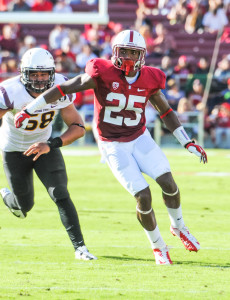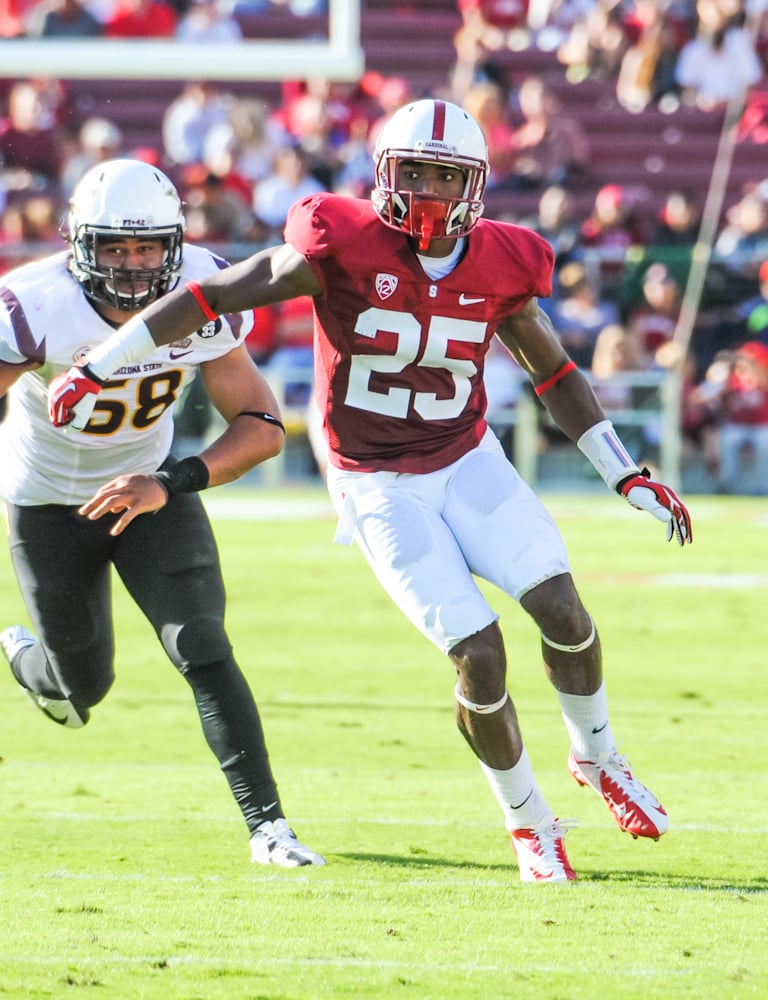If you’re a Pac-12 offensive coordinator, you’ve got to pick your battles when going up against Stanford. It’s probably not wise to attack the Cardinal’s vaunted front seven — thus, only 15 Division I teams have faced fewer carries per game than Stanford has — or its ballhawking safeties — thus, only eight of the 184 completions against the Cardinal have gone for 30 yards or more.
By process of elimination, then, Stanford’s opponents have been picking on its corners, sophomore Alex Carter and junior Wayne Lyons. There’s just one problem with that strategy: Few young players have garnered as much praise from head coach David Shaw as Carter and Lyons have.
Back when Lyons was a freshman, Shaw said he could very well become one of the best defensive backs in the country by the end of his career; earlier this month, Shaw claimed that Carter could go at only 75 percent and still cover most receivers. But have Stanford’s corners lived up to the hype?

Carter, for one, has continued to improve after his breakout 2012 campaign, which saw him earn All-Pac-12 Honorable Mention as a freshman. That has put a lot of pressure on Lyons — not to live up to his coach’s expectations, but to shoulder the burden when offenses try to keep the ball away from Carter.
“[Lyons] is a competitive guy,” said defensive coordinator Derek Mason. “He takes it personally when guys think, ‘Oh, you won’t throw it to [Carter], but you’ll throw it to me.’”
Few expected that fate for Lyons back in 2011. The then-freshman stood out to his coaches for his competitiveness, his strength and his refusal to shy away from contact, and it appeared that he would soon become Stanford’s top corner.
Lyons’ development, however, was somewhat sidetracked by a broken foot he suffered his freshman year. He wasn’t as explosive when he returned in 2012, limiting his production to 25 tackles, a mark he surpassed in just the first five games of this season.
“It’s been a great journey,” Lyons said of his recovery. “[Director of Sports Performance Shannon] Turley did a great job helping me recover…I can move the way I want to now.”
Mason noted that while Lyons’ physical development took a slight detour, his mental improvement continued through the injury.
“Coming from [a] high school where he played almost every position because he was everything to his team, the thing that you see now is that he’s able to settle into a position and learn, gain experience, watch guys before him who are now playing in the NFL,” Mason said. “He’s actually started to increase his football IQ; but more than that, he’s really starting to come into his own, because he’s older…He’s getting better every time he touches the grass.”
That was apparent earlier this season, when Lyons took three pass interference penalties in a span of just two weeks against Arizona State and Washington State. Around that time, Mason noted that Lyons’ aggressive style of play would inevitably result in penalties, but that as the corner matured in his new starting role, he would get a better feel for when the referees would throw a flag. In the three games since the matchup with the Cougars, Lyons hasn’t been flagged for interference once.
The Cardinal will need that kind of disciplined play from Carter and Lyons this weekend when it goes up against Oregon State’s passing attack, which boasts the best statistical quarterback (Sean Mannion, 2,992 passing yards) and wideout (Brandin Cooks, 1,176 receiving yards) in the country. Though the matchup is a test of both Stanford corners’ development, chances are the Beavers will do what every other Cardinal opponent does: pick on Lyons.
“The one thing I’m trying to get him to understand is really just [to] take it in stride,” Mason said of the competitive Lyons. “Just continue to play hard and good things will happen.”
Contact Joseph Beyda at jbeyda ‘at’ stanford.edu.
